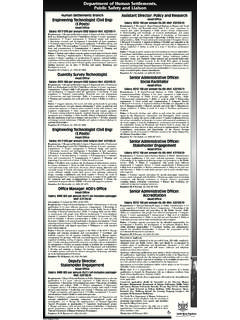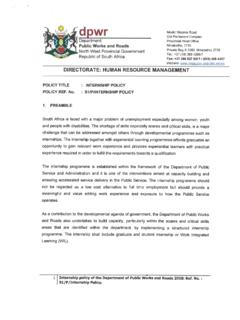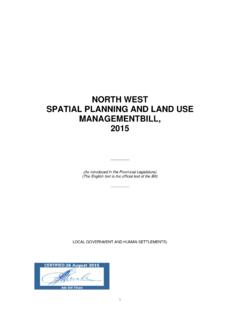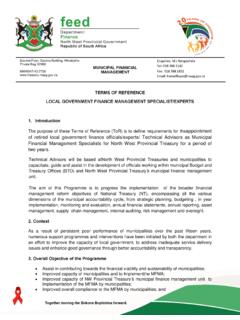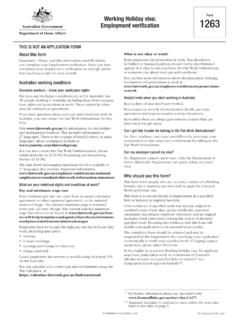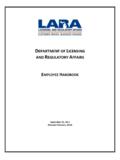Transcription of DISCIPLINARY ENQUIRY - North West
1 DISCIPLINARY ENQUIRY HELD AT: DEPARTMENT OF PUBLIC WORKS Roads and Transport Offices Mafikeng, Northwest Province. THE DEPARTMENT OF PUBLIC WORKS, ROADS AND TRANSPORT ( the Department ) Employer and MR. EDDIE THEBE Employee SANCTION 1. In terms of the DISCIPLINARY Code and Procedures contained in Resolution Number 2 of 1999 which is a collective agreement between the employer and employees, where an employee is found guilty by a DISCIPLINARY ENQUIRY , the DISCIPLINARY processes should be a two phased ENQUIRY .
2 The first ENQUIRY is the establishment of misconduct which in this particular matter has already been found to exist. The next phase is to determine the appropriate penalty for the misconduct in respect of which the employee has been found guilty. 2. In general, the intended purpose and scope of the DISCIPLINARY code and procedures is to support constructive labour relations in the public service, to ensure that managers and employees 2 share a common understanding of misconduct and discipline, to promote acceptable conduct or to avert and correct unacceptable conduct.
3 Some of the principles upon which the code and procedure is based is that discipline which is a management function is a corrective measure and not a punitive one, and that it must be applied in a prompt, fair, consistent and progressive manner. In the event the alleged misconduct justifies a more serious form of DISCIPLINARY action than provided in some parts of the DISCIPLINARY code, the employer is permitted to initiate a DISCIPLINARY ENQUIRY .
4 Accordingly, it is only in respect of serious misconducts that the employer may, in terms of the code, convene a DISCIPLINARY ENQUIRY to deal with the alleged type of 3. In terms of Schedule 8, Item 3(2) and (3) the concept of corrective or progressive discipline is encouraged and in terms of which discipline is taken as a means for employees to know and understand what standards are required of them. All efforts should thus be made to correct employees behaviour through a system of graduated DISCIPLINARY measures such as counselling and warnings.
5 Dismissal should be reserved for cases of serious misconduct or repeated 1 See Resolution No. 2 of 1999 clause 6 on serious misconduct. 2 See Schedule 8, Code of Good Practice Dismissal, Item 3(2) and (3). 3 4. In brief, the employee representative addressed me at length on the need, in the circumstances of this case, to adopt a similar approach that all efforts should be made to correct Mr Thebe s behaviour through a system of graduated DISCIPLINARY measures in that dismissal is not an appropriate sanction.
6 He accordingly called upon me to impose any of the following sanctions: Any manner of a warning which may also be a final warning; Suspension without pay for not longer than three (3) months; or A transfer to another department so that he could plough back the investments that the Department had made on him in funding for his education until at Masters level. 5. The submissions were largely based on Mr Thebe s personal circumstances, clean DISCIPLINARY record and the fact that he had not been found guilty of fraud or corruption for his personal gain.
7 Whilst on the other hand the Department urged me to impose a sanction of dismissal. 4 6. Mr Thebe submitted that the test on mitigating factors is whether the facts taken individually or cumulatively whether he would repeat the same offence in respect of which he has been found guilty. For this reason, he referred me to the following facts, his long service, personal circumstances that he is remorseful and his commitment to the workplace. He submitted that long service is an important or weighty consideration, depending on the circumstances to determine whether he will repeat the offence or not.
8 7. With regard to his long service, he commenced working for the Department in its Traffic Section on 27 January 1981. Since then, the Department has been and still is the only employer from a very young age, whilst he was in his twenty s. In 1984 he was promoted to a Chief Traffic Officer and in 1988 he was transferred to the Transport Section as a Road Safety Liaison Officer. In 1995 he became a Deputy Director for Road Safety. In 2005 he became a Director for Road Safety.
9 In 2006 he was promoted to a Director for Roads. In 2007 he became an Acting Chief Director for Roads Management and in 2008 he became Chief Director, Road Management which is the position he currently occupies. He has accordingly over 22 years of service within the Department of Transport. 5 8. During this period he was never charged nor found guilty of any misconduct within the workplace accordingly he has a clean DISCIPLINARY record. It was contended that such an impressive record is a weighty factor to be considered in the determination of an appropriate sanction and it is also an indicator whether he will commit the same offence or not.
10 9. It was submitted on his behalf that he has no propensity to commit the same or similar transgressions and since he now knows of the offences or conducts constituting offences, various safeguards can be implemented to avoid such from him happening again. Mr Thebe accordingly tendered his commitment to all the workplace values now that it has become clear what the complaints are against him. He is fifty years old, close to retirement and committed to staying with the Department until his retirement.
